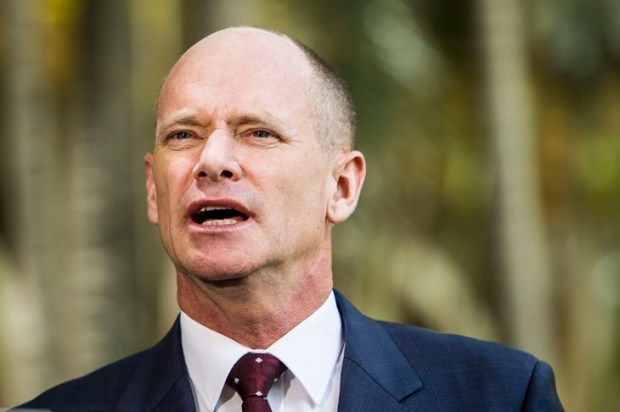With a never-ending increase in red tape across the healthcare industry, you might be surprised to learn that ‘gender-affirming care’ for children appears to be escaping strict regulation.
In Senate Estimates, the Therapeutic Goods Administration (TGA) confirmed they are happy to vacate the field on the administration of puberty blockers and cross-sex hormones to children, admitting they see no need to micromanage the prescription of such drugs off-label.
As reported by The Australian, Therapeutic Goods Administration Chief Medical adviser Robyn Langham was asked about the regulation of puberty blockers being prescribed off-label to children as young as 10 years old.
Professor Langham said it was up to individual doctors to use their clinical judgment in prescribing the drugs and the TGA had no role in the matter. ‘Where doctors wish to prescribe off-label, we do not regulate doctors’ practice,’ she said in response to questions from Nationals senator Matt Canavan.
‘When a doctor chooses to do that, they do so in the full knowledge that they are accepting all of the legal responsibility, that they understand the research and they get full consent of their patients.’
As a peak health body responsible for assessing medical products, the TGA’s apparent failure to appreciate the dangers and unknowns of gender-affirming drugs – and the impossibility of a child’s meaningful consent – is inexcusable, in my opinion.
When the storm of regret from children wronged by these drugs eventuates, regulatory authorities won’t be able to escape blame. With the well-being of future generations at risk, senior health leaders cannot sit this one out and must instead exercise what authority they hold to proactively protect minors.
Regarding Langham’s statement, ‘where doctors wish to prescribe off-label, we do not regulate doctors’ practice…’ as I recall, this was not the attitude the TGA took to the Covid pandemic. They seized the opportunity to ban off-label uses of Ivermectin, citing ‘concerns with the prescribing of oral Ivermectin for the claimed prevention or treatment of Covid’.
The TGA has previously intervened in off-label prescriptions, but only when they consider it necessary to protect health and safety. Observers may find the standard perplexing, given that one intervention involved the use of an ordinarily available drug in widespread use to counter what is effectively a flu. But when it comes to the ‘decision’ by developing children to consume puberty blocking drugs – the consequences of which are vague and potentially devastating to their mental and physical health – the TGA says ‘live and let live’.
The potential consequences of puberty blockers cannot be overlooked. England’s National Health Service (NHS) notes that the psychological effects of puberty blockers on children are unknown, meaning that this generation will effectively serve as the ‘guinea pigs’. Studies have, however, linked puberty blockers to devastating effects on sexual function and bone density – with two recent studies suggesting that those suffering from the latter effect ‘do not fully rebound and lag behind their peers’.
Irreversible changes are also associated with the consumption of cross-sex hormones, including breast development, voice deepening, and disturbingly, infertility. Given over 90 per cent of children administered puberty blockers proceed to take cross-sex hormones, these adverse consequences are no minor matter. Far from being gender-affirming ‘care’, this medical process is one of the most effective avenues available for children to destroy their quality of life.
By virtue of their inherent immaturity and lack of development, children are unable to understand or appreciate the risks associated with the consumption of such significant drugs – a fact known well by Keira Bell. This means that children cannot consent to taking puberty blockers, even when prescribed.
After struggling with her sexuality in her early teen years and being influenced by the suggestion she was transexual by those around her, Bell was prescribed puberty blockers and cross-sex hormones by the Tavistock Gender Clinic at ages 16 and 17, respectively. She then underwent a double mastectomy at age 20 – the seemingly logical step after developing facial hair and a deep voice following the consumption of cross-sex hormones. However, at 23 years of age, Bell sued the clinic over their alleged failure to challenge her decision to take ‘gender-affirming’ drugs as a child. In her words, ‘I made a brash decision as a teenager (as a lot of teenagers do) trying to find confidence and happiness, except now the rest of my life will be negatively affected.’
While stories like Bell’s are largely ignored by the affirmation industry, the lack of regulation or oversight by federal bodies is bearing practical consequences. MDA National, one of Australia’s largest medical insurers, has recently withdrawn cover for private-practice doctors who prescribe cross-sex hormones to children. In making this decision, the Insurer’s President cited the likelihood of ‘significant claims from individuals through expressed regret years down the track about decisions they made when they were very young’ – and rightly so. Yet private GPs are now stuck between a rock and a hard place; on the one hand, they operate in an environment pushing them to embrace ‘gender-affirming care’ lest they face accusations of ‘transphobia’, ‘discrimination’ and ‘bigotry’, and on the other, they face the loss of protection should the subjects of this process realise their mistake years later and seek recourse.
The TGA’s decision to wave the white flag over an issue that properly justifies opposition is disappointing. As the most vulnerable, impressionable class in society, children deserve nothing short of the fullest protection.
Edmund Stephen is a Contributor for Young Voices.

























